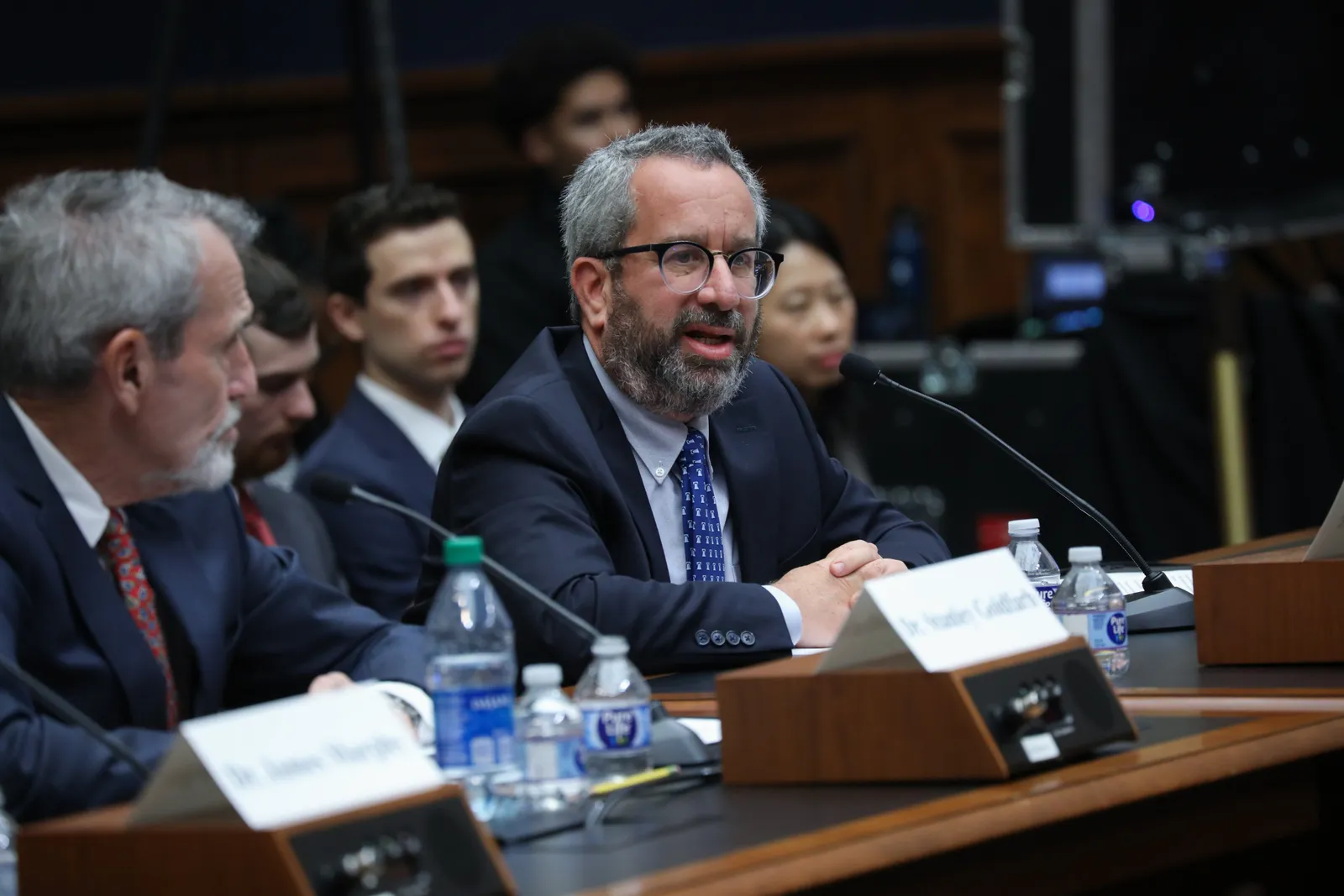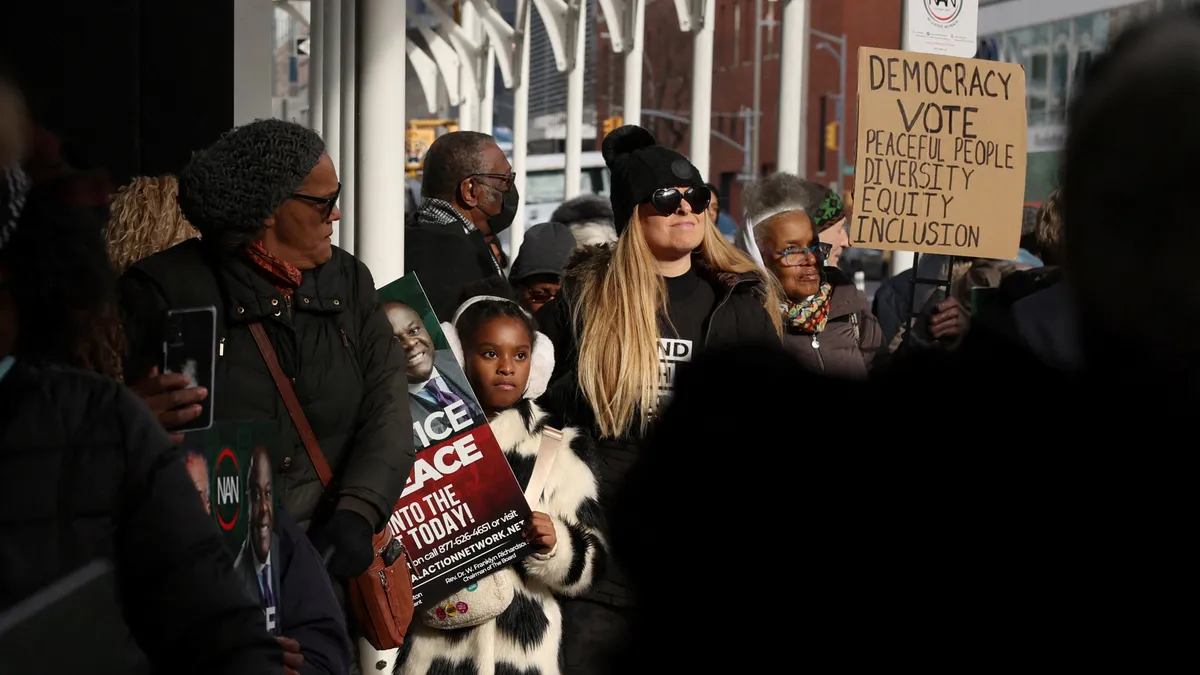Growing efforts to limit diversity, equity and inclusion programs in elementary and secondary schools may negatively impact special education activities meant to expand inclusive opportunities for students with disabilities, warn some special education and disability rights advocates.
Several of these advocates said there's little evidence so far that anti-DEI efforts are excluding special education students from general education activities or even explicitly proposing this. But they expressed growing concerns about what they say is a misunderstanding about inclusive special education under the politically charged DEI label.
They point to anecdotal examples of opposition to general and special education co-teaching practices, scrutiny over special education teacher prep materials, and legislative efforts to separate students with disruptive behaviors from general education classrooms.
"There could be some chilling effects or some kind of negative impacts of the overall anti-DEI efforts on how things look for kids with disabilities in schools," said Dan Stewart, managing attorney for education and employment at the National Disability Rights Network, or NDRN, a nonprofit that advocates on behalf of the legal rights of people with disabilities.
Another fear is that the anti-DEI movement will lead to a return of the stigmas and segregation of students with disabilities that occurred before the 1975 enactment of the landmark federal civil rights law requiring public schools to provide free appropriate public education for students with disabilities.
"There's the very significant concern that efforts that have been going on for decades are now going to be subsumed under the political machinations regarding the anti-DEI efforts," Stewart said.
Propelled by mainly conservative policymakers, DEI critics are pushing for schools to focus on the basics of academics and shared American values rather than on what they call "divisive" instruction and training on racial disparities and gender identities. While anti-DEI measures are more prevalent in workplaces and higher education, K-12 schools are also being targeted by some DEI critics raising concerns that certain lessons and materials are indoctrinating students and further contributing to racial prejudices.
If everybody understood special education inclusion, then I think we would see a higher level of inclusion than we do already.

Robyn Linscott
Director of education and family policy at The Arc
A researcher for the Heritage Foundation, a conservative think tank and policy advocacy group critical of DEI activities, said the disability rights field should not be alarmed by efforts to dismantle DEI initiatives in schools. In fact, he said the pro-DEI movement may do more harm than good to disability rights advocacy.
"The rollback of DEI is actually beneficial for special education, because it allows special education advocates to fight for their own interests and rights without being subsumed in a broader movement that actually does not prioritize their concerns," said Jay Greene, senior research fellow in the Heritage Foundation's Center for Educational Policy.
On the defense
The Individuals with Disabilities Education Act requires schools and families to make individualized decisions about including students with disabilities in general education programming. The law holds schools accountable for educating students with disabilities alongside their peers without disabilities to the maximum extent possible, also known as "least restrictive environment."
Disability rights advocates, special educators, researchers and the U.S. Department of Education have pointed to short-term and long-term benefits of inclusion for students both with and without disabilities, including high expectations for academic progress.
And while efforts in some Republican-led states to restrict DEI initiatives and classroom discussion on race and gender-related topics aren't directly focused on special education programming, they are putting disability rights advocates on the defensive against what they see as threats to inclusive practices.
"I think that the negative attention that we're seeing to the DEI efforts can really breed this culture of intolerance, to breed this culture of bullying, to breed a culture of discrimination," said Robyn Linscott, director of education and family policy at The Arc, a nonprofit that advocates for people with intellectual and developmental disabilities.
Most students with disabilities spend 80% or more of their day in general ed classes
Participation of special education students in general education classes has increased over the past few years. According to the Education Department, 67% of school-aged students with disabilities attended general education classrooms for 80% or more of their school day in fall 2021, the last year for which data is available. That was up from 63% in fall 2016.
But the number of preschool children with disabilities who received special education services in settings separate from their peers without disabilities, which was 55% in 2021, has largely remained unchanged over the past four decades.
Additionally, non-White students made up the majority of students ages 3-21 who received IDEA services during the 2021-22 school year, according to federal data. But personnel entering the special education and early intervention field are predominately White.
Racial disproportionality in special education on the rise
Under IDEA, districts must measure for racial disparities in special education annually in 14 categories — including a student’s disability identification, where a student’s learning takes place, and discipline — as well as for seven racial and ethnic groupings.
Between the 2018-19 and 2020-21 school years, Education Department data showed a nearly 100% increase in the number of districts identified with what’s known as “significant disproportionality,” where students in special education programs are overrepresented by race.
There is no indication that anti-DEI efforts contributed to the increase in significant disproportionality during that time. But, some educators and advocates say controversial legislation in several states restricting instruction and training on racial injustices is having a negative spillover effect on some districts’ approaches to remedying racial inequities, administrators and advocates have said.
In Utah, where a new law prohibits public school DEI programs, disability rights advocates are closely monitoring other legislative activity that they said could threaten inclusive education progress or even potentially violate IDEA-required practices.
Disability Law Center, a Utah nonprofit that advocates for people with disabilities and is a state affiliate of NRDN, has opposed HB 347, a law that Gov. Spencer Cox signed on March 12 that would require school districts to provide safe and "minimally disruptive" educational environments for all students. Specifically, the law says schools must provide education in the least restrictive environment that "does not result in a pattern of behavior that interferes substantially and materially with the instruction of the other students in the classroom."
That wording is troublesome, some say, since it could lead to the exclusion of students whose disabilities can impact their behavior.
"What would happen to a student with Tourette’s syndrome under this bill? Or a student who displays stimming behavior like flapping their hands? Where would schools have them go, if their behavior does interfere with other students, which seems very likely for these students?" the Disability Law Center wrote in a March 5 letter to the governor, asking him to veto the bill.
The rollback of DEI is actually beneficial for special education, because it allows special education advocates to fight for their own interests and rights without being subsumed in a broader movement that actually does not prioritize their concerns.

Jay Greene
Senior research fellow in the Heritage Foundation's Center for Educational Policy
The center also testified in opposition to SB 137, a bill that would have given teachers the authority to remove a student from a classroom for disruptive behaviors. That could have jeopardized IDEA disciplinary due process protections for students with disabilities, the center said.
That language has since been removed from the bill, which more broadly seeks to empower and retain teachers in the state.
"We are seeing some concerning stuff around pushing back on the idea of inclusion, generally of students with disabilities," said Nate Crippes, Disability Law Center's public affairs supervising attorney.
However, he added, Utah has also seen proactive grassroots efforts and state board of education action to promote awareness of and support for inclusive special education practices.
Impact on teacher education programs
Across the country, there are increasing concerns about how anti-DEI efforts are impacting special education teacher preparation programs as textbooks and sllyabi with the word "inclusion" are being questioned.
In fact, teacher prep coursework materials often contain the word "inclusion," according to Kyena Cornelius, president of the Teacher Education Division of the Council for Exceptional Children. Cornelius noted that IDEA history and including students with disabilities in general education programs are core study areas for aspiring teachers.
"We want special ed teachers to help educate students with disabilities so they become productive members of society, but if they aren't included with productive members of society, how are we going to [do that]?" asked Cornelius, who is also a professor in the School of Special Education, School Psychology, and Early Childhood Studies at the University of Florida.
The Arc's Linscott, who is a former special education and history teacher, said it's imperative that prospective teachers learn about special education inclusion and efforts to reduce racial disproportionality of students with disabilities.
"If everybody understood special education inclusion, then I think we would see a higher level of inclusion than we do already," Linscott said.
Some DEI opponents, meanwhile, are questioning co-teaching approaches — where general and special educators are paired in a classroom — as an inclusive practice, Cornelius said.
Building awareness about inclusion
Using DEI activities as opportunities to increase student belonging and acceptance of marginalized groups is not what concerns critics, said the Heritage Foundation's Greene.
"The word ‘inclusion’ is a good word," Greene said. "The word ‘diversity’ is a good word. And it would be a shame if we abandoned those words for their good and legitimate purposes, just because some people have appropriated them for bad purposes."
He said the origin of DEI, as critics see it, is an ideological foundation that groups people into oppressors or oppressed, not based on individual merit but on a group identity. The oppressed are then seen as deserving of restitution for historic and collective wrongs, and oppressors are viewed as those whose privileges should be taken away, Greene said.

The problem with this DEI world view, Greene said, is that rather than treating everyone the same, people are treated differently based on their oppressor or oppressed status. And people with disabilities can be either oppressed or oppressors, he said. As such, those supporting DEI initiatives are "not really including disability in their intersectional set of alliances, precisely because advantaged people can also have disabilities," he said.
Greene questioned, for example, how DEI proponents can advocate stripping advantages from wealthy children with disabilities in favor of poor children with disabilities. "If they do that," he said, "then they're helping some disabled students and hurting others."
It should be common knowledge that special education inclusion is "about making reasonable accommodations so that students with special needs can thrive in regular classroom environments," Greene said. "Once you explain it to people, everyone gets it with no problem, and they don't confuse it for the other kind of DEI that is about splitting the world into oppressors and oppressed."
But not everyone will make that connection, disability rights advocates said. More important, they said, they don't want one group to feel marginalized because another one has a stronger platform.
"If we allow this vocal group of people to change the way we talk and act about other groups of people, then we're allowing this othering to happen at such a rate that we're going to go back to students with disabilities having to stay home," CEC's Cornelius said.
According to Stewart, of NDRN, the significant problem with anti-DEI action is its breadth. "It could mean so many different things," he said. "And without clear definitions about what it is that politicians in different states are considering bad and good, there's the overall concern that lots of things could be tamped down."
Overall, disability rights and special education advocates say they are strong supporters of DEI efforts to reduce racial biases in schools. But in aligning with DEI efforts, do they risk sowing further doubt from critics about the validity of special education inclusion services? If they take a stance that disability inclusion is separate from race and gender-equity programs, are they perpetuating the marginalization of one cause over others?
For now, educating people about the benefits of inclusive practices is one way to help skeptics and those unaware to understand their importance, said both Stewart and Cornelius.
"It's not a fight. It shouldn't be a fight," said Cornelius. "It should be me telling my story."
For example, if a textbook or syllabus is criticized for having the word "inclusion," then that should be a teaching moment to explain how university-level curriculum is approved, along with the purpose of IDEA, least restrictive environment and inclusive practices, she said.
Cornelius suggested people share stories with school board members about the positive impact of special education inclusion. "That's where you have the most impact," she said.






















